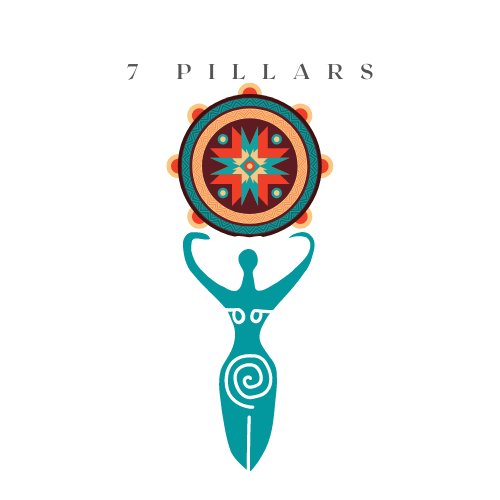Our Mission and Vision
Our mission is to create a decolonized collaborative of grassroots organizers based on the 7 principles of Indigenous community building. The collaborative will work together to support underserved LGBTQIA+ communities. We aim to utilize these principles to form an innovative benchmark for organizing work and creating stronger communities and sustainable organizations.
Our vision is to decolonize how we view, practice, and sustain community organizing. Decolonizing community work removes systemic inequities that foster competition instead of cooperation. We achieve this by understanding, teaching, and applying the indigenous principles that enabled peaceful interdependence before colonization.
Meet the team
7 Pillars is led by BIPOC, TGNCI/LGBQA+, disabled, and justice-involved community organizers. Our unique group of facilitators and volunteers come from an eclectic mix of cultures, identities, educations, and lived experiences that represent the communities we serve. We work towards the singular purpose of decolonizing non-profit organizations. The focus of our leadership is to create an atmosphere of acceptance, accountability, and mutual support.
Obstacles We Face
Grassroots organizing is fragmented due to nonprofit competition for limited resources. Most grassroots organizers only have the capacity to focus on one area of need rather than addressing the multiple issues that impact marginalized communities. When organizations are limited to one service area, they help with temporary solutions rather than addressing the underlying domino effect of insecurities that marginalized people face. 7 Pillars community organizing shifts ideas toward decolonized intersectional work for a more significant impact. Building collaborative programs between multiple organizations can address intersectional issues, making both services more sustainable.
8 Goals for 7 Pillars
-
Complex organizing language alienates those who want to get involved. Many disenfranchised folks we work with say they want to help, but they feel too uneducated to do the work…. the work that is supposed to be centered around THEM. Organizers use academic vernacular because it appeals to grantors, but these words provide no support or comfort to the communities that we serve. We must make space for those without exposure to the same language as someone with access to education. We meet people where they are, give them agency, and respect the wisdom of their lived experiences. This helps us serve communities by simplifying terminology and respecting diverse backgrounds.
-
To be decolonized is to honor the connection between every living thing and the Earth. It is impossible to overcome oppression when tribes are fighting from within. Organizers supporting only one community or group do not align with our principles. While we focus on supporting LGBTQIA+ communities, we will seek partnerships with organizations that support more than one community. By creating a community of collaborative existing resources, we aim to strengthen networks and create an atmosphere that brings unity instead of competition.
-
Organizers themselves are often members of the communities they represent. Organizations are exposed daily to the trauma associated with the people they support. We uplift and support organizers themselves while teaching self-care and awareness to ensure the longevity of our work by protecting the ones doing it.
-
Pre-colonization, healthy relationships among communities were based on equality, equity mutual respect. However, the introduction of colonial influence in the culture of healthy relationships has been disrupted. If the goal of our movement is to create justice and equality or provide protection for people on the planet, it has to include everyone. We aim to establish a network of support that we call a sacred circle. This sacred circle gives equal voices to the disabled, youth, women, and elders.
-
Decolonization thrives on embracing individual wisdom, and connecting diverse knowledge to abolish oppressive systems. To bridge the fragmentation gap, we must create a community of grass-roots organizations that learn from each other to work more holistically together. Wisdom in decolonization is celebrating who we are, connecting with the unique knowledge we each bring to the table, and making space for everyone.
-
It’s not a badge of honor to be well-adjusted to a sick society. Decolonization challenges established norms and invites resistance. Creating a space of true decolonization will challenge everything taught in colonial society. We cannot reclaim rights or protections for ourselves that we aren't willing to demand for others. Being able to face resistance to change is just as important as resisting colonial systems.
-
Decolonization is for everyone. Both the colonized and the settlers suffered trauma in the process of colonization. The colonization process was voluntary for one group and involuntary for the other, yet it cost both groups to lose their history, traditional lands, and culture. Our overall goal is to teach a better way forward for community building. We recognize that all people have been brought up within oppressive systems. We allow room for mistakes and remain open for growth. 7Pillars was originally a “Second Chances” program for prisoners. People are not disposable. We know that people can change their hearts, minds, and lives. Those are the people who have the most significant impact on their communities.
-
Decolonization is not just the solution for dismantling oppressive systems. It’s also the solution for climate change issues. Every human ancestor practiced living sustainably for thousands of years. Building sustainable communities is the foundation of pre-colonized societies. Decolonization requires us to reconnect with the Earth and reverse the traumatic impact of colonization on our land and agricultural traditions.








